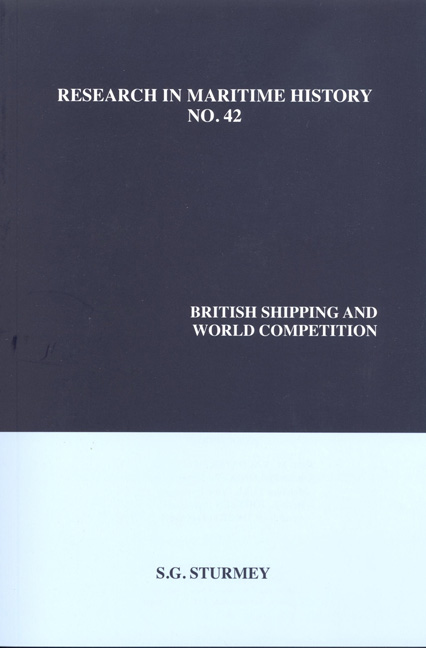Book contents
- Frontmatter
- Table of Contents
- Series Editor's Foreword
- About the Author
- Preface
- Figures and Tables
- Chapter 1 The Problem Defined
- Chapter 2 High Water: The Pre-1914 Period
- Chapter 3 War and Reconstruction
- Chapter 4 The Troubled Years: The Interwar Period
- Chapter 5 Nationalism in Shipping in the Interwar Years
- Chapter 6 The Birth of the Liberty
- Chapter 7 The Prosperous Age: The Postwar Period
- Chapter 8 Enemies of Competition in the Postwar Years
- Chapter 9 Flags of Convenience
- Chapter 10 Economics of Shipping Enterprises
- Chapter 11 Shipowning and Resource Allocation
- Chapter 12 Labour Relations and Labour Costs (by Basil Mogridge)
- Chapter 13 The Conference System
- Chapter 14 The Structure of the British Industry
- Chapter 15 The Question Answered
- Epilogue The Future
- Appendix The Contribution of British Shipping to the Balance of Payments
- Bibliography
- Index
Chapter 10 - Economics of Shipping Enterprises
- Frontmatter
- Table of Contents
- Series Editor's Foreword
- About the Author
- Preface
- Figures and Tables
- Chapter 1 The Problem Defined
- Chapter 2 High Water: The Pre-1914 Period
- Chapter 3 War and Reconstruction
- Chapter 4 The Troubled Years: The Interwar Period
- Chapter 5 Nationalism in Shipping in the Interwar Years
- Chapter 6 The Birth of the Liberty
- Chapter 7 The Prosperous Age: The Postwar Period
- Chapter 8 Enemies of Competition in the Postwar Years
- Chapter 9 Flags of Convenience
- Chapter 10 Economics of Shipping Enterprises
- Chapter 11 Shipowning and Resource Allocation
- Chapter 12 Labour Relations and Labour Costs (by Basil Mogridge)
- Chapter 13 The Conference System
- Chapter 14 The Structure of the British Industry
- Chapter 15 The Question Answered
- Epilogue The Future
- Appendix The Contribution of British Shipping to the Balance of Payments
- Bibliography
- Index
Summary
Two conditions are necessary if an industry is to be able to expand. First, it must be able to attract and retain capital and labour in competition with other industries. Second, it must be able to sell its product in competition with its competitors. If these two conditions are not satisfied then a failure to expand is inevitable. Put another way, if either of these conditions has not held for British shipping for any significant period, then the first possible answer to the question posed in chapter 1 is clearly applicable. The task in this and the two subsequent chapters is to consider the nature of, and the variations in, the economic factors involved in the provision of shipping services in order to test the validity of the first possible answer to the question. Matters relating to the future of the British shipping industry arise in this analysis and, as promised in chapter 1, these will also be pursued so that both the dominant theme (the explanation of the past) and the subordinate theme (the prospects for the future) are intertwined.
This chapter will concentrate mainly on the domestic issues relevant to the first condition related above. This will be done by considering the economics of different ship types, their cost structures and the profitability of their operations. The international issues with which the second condition is concerned will be considered in the next chapter, while the statistical material concerning the most important cost item, labour, is presented in chapter 12.
Liners
Liners constitute the largest single group in British shipping; over one-half of the total, and three-quarters of the dry-cargo tonnage is classed as liner tonnage (see table 14.1). The term “liner” covers a wide range of vessels, the element of homogeneity in the classification being found in the nature of the employment of the ships. Liners are ships plying a fixed route or routes, sailing according to a pre-determined schedule, which offer cargo and/or passenger space at fixed rates to those who wish to have goods transported or to make journeys.
It is usually said that liners sail on schedule whether full or empty, but this is an over-simplification when applied generally to all liners.
- Type
- Chapter
- Information
- British Shipping and World Competition , pp. 197 - 222Publisher: Liverpool University PressPrint publication year: 2009



